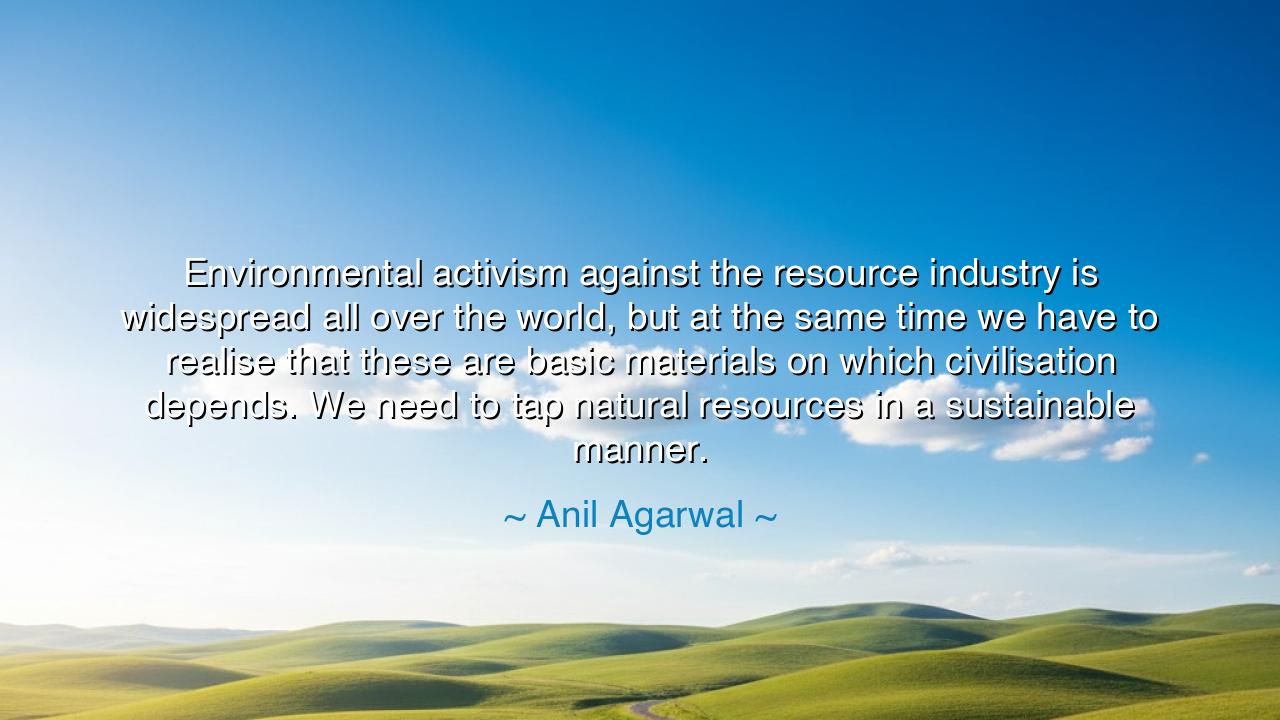
Environmental activism against the resource industry is
Environmental activism against the resource industry is widespread all over the world, but at the same time we have to realise that these are basic materials on which civilisation depends. We need to tap natural resources in a sustainable manner.






Anil Agarwal once proclaimed with balance and vision: “Environmental activism against the resource industry is widespread all over the world, but at the same time we have to realise that these are basic materials on which civilisation depends. We need to tap natural resources in a sustainable manner.” These words do not come as a denial of the anger of the earth, nor as a blind defense of industry. They come as a call to harmony—a reminder that the path forward is neither reckless exploitation nor rigid rejection, but wisdom, moderation, and stewardship.
When he speaks of environmental activism, Agarwal acknowledges the voices of the people, rising against destruction, pollution, and the loss of forests, rivers, and lands. These voices are ancient and modern alike, for humanity has always cried out when the balance of nature was broken. The prophet, the poet, and the peasant have all stood at times against the powerful who cut down too much, who mined too deep, who drained too far. Yet he reminds us, with humility, that the world itself is built upon materials—wood, stone, metal, oil, and water—that have shaped the very bones of our civilisation.
The ancients knew this duality well. The Egyptians mined copper and quarried limestone to build their temples. The Greeks felled forests to build their ships. The Romans carved roads and aqueducts from stone, turning natural wealth into the infrastructure of empire. But they also saw, too late, the dangers of excess: hills stripped of trees, soils exhausted, rivers silted and dry. History tells us that resources are both gift and test, blessing and burden, to be used with reverence lest they vanish and leave desolation behind.
This is why Agarwal calls us toward sustainability—the art of taking without destroying, of harvesting without exhausting. Just as a shepherd grazes his flock but allows the grass to regrow, so too must humanity draw upon the earth in ways that leave it alive. Consider the example of modern forestry in nations that plant two trees for every one cut down. Though imperfect, this practice reflects the ancient wisdom of renewal: that what is taken must be given back, that civilisation endures only when it tends the soil from which it grows.
But his words also serve as a warning to those who think that rejection alone is enough. To halt all mining, all drilling, all harvesting is not possible, for our homes, our medicines, our tools, and our very energy depend upon the materials of the earth. To ignore this is to deny reality. True activism must therefore not only resist destruction but guide industry toward balance, demanding accountability, innovation, and renewal. It is not enough to shout “stop”; one must also say, “do better.”
The lesson for us, then, is one of responsibility. Each of us depends on these natural resources—the electricity that lights our homes, the metals in our devices, the food drawn from soil and sea. Therefore, each of us bears a duty: to consume wisely, to support practices that renew rather than exhaust, to demand from leaders and industries not blind extraction but thoughtful stewardship. For in every act of consumption lies a choice—to be complicit in destruction or to be a partner in renewal.
So let Agarwal’s words be remembered as a guiding law: civilisation itself is woven from the earth, but the earth must not be broken in the weaving. Environmental activism is the conscience of the world, and sustainable use is its wisdom. Only when the two walk together—activism demanding restraint, industry committing to renewal—will humanity thrive without devouring its future. For to live in harmony with the land is not weakness, but strength; not a hindrance, but the truest path to enduring greatness.






AAdministratorAdministrator
Welcome, honored guests. Please leave a comment, we will respond soon